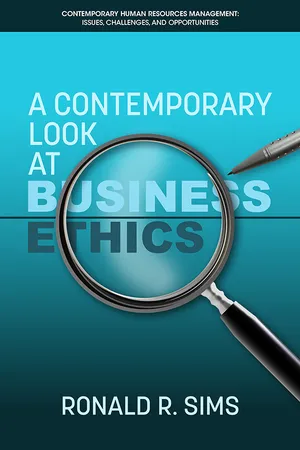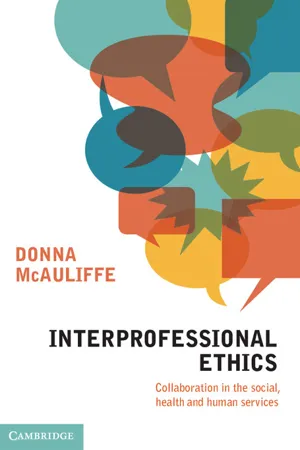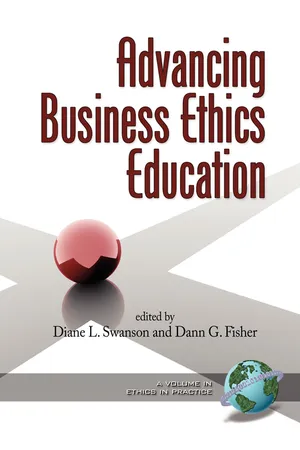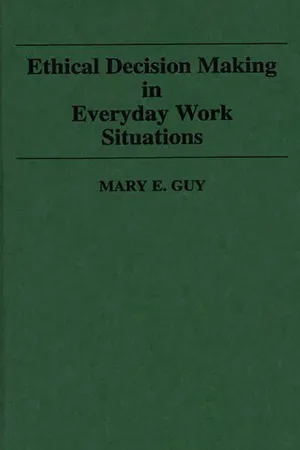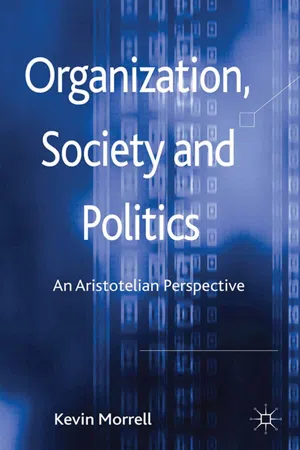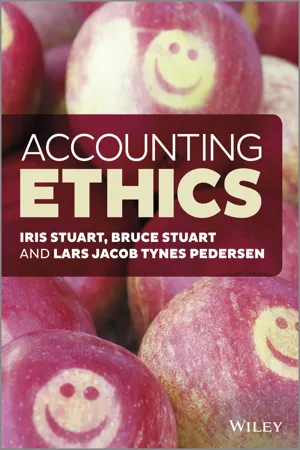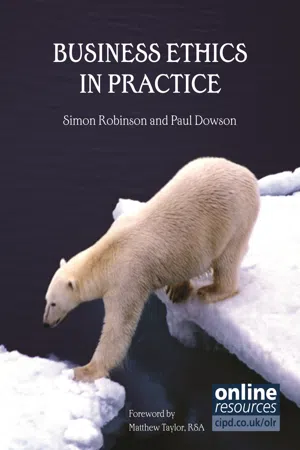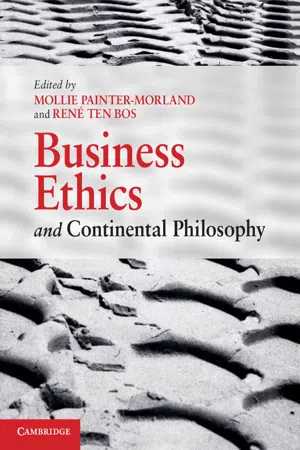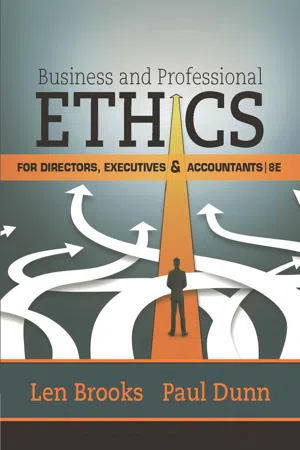Business
Ethical Decision
An ethical decision in business refers to a choice made by an individual or organization that aligns with moral principles and values. It involves considering the impact of the decision on various stakeholders and choosing a course of action that is fair, honest, and respectful. Ethical decisions are essential for maintaining trust, reputation, and long-term success in business.
Written by Perlego with AI-assistance
Related key terms
1 of 5
11 Key excerpts on "Ethical Decision"
- eBook - PDF
- Ronald R. Sims(Author)
- 2010(Publication Date)
- Information Age Publishing(Publisher)
A Contemporary Look at Business Ethics, pages 297–346 Copyright © 2017 by Information Age Publishing All rights of reproduction in any form reserved. 297 7 Ethical Decision-Making Easier Said Than Done? D ecisions about right and wrong permeate everyday life. Ethics should concern all levels of organizational life: acting properly as individu- als, creating responsible organizations and governments, and making our society as a whole more ethical. As the title of this chapter suggests, making decisions about right and wrong or Ethical Decision making is easier said than done. In reality, this chapter recognizes that decisions about “right” and “wrong” can be difficult, and may be related to individual or organiza- tional contexts. The foundation of Ethical Decision-making involves choice and bal- ance; it is a guide to discard bad choices in favor of good ones. Therefore, in making Ethical Decisions, one way to make the decision is to consider “what a reasonable person would do in this situation?” And while that might be a good place to start, given the increased complexity of decision-making in general, and Ethical Decision-making in particular, there is a need for a more in-depth process for choosing among alternatives and deciding upon an ethical course of action by employees when confronted with decisions 298 A Contemporary Look at Business Ethics with no clear course of action. The reality is that this is most often the case in contemporary organizations. Ethical Decision-making refers to the process of evaluating and choos- ing among alternatives in a manner consistent with ethical principles. In making Ethical Decisions, it is necessary to perceive and eliminate unethical options and select the best ethical alternative. 1 Eliminating unethical options requires relying most often on ethical standards and thinking. Ethical standards are the standards of our environ- ment that are acceptable to most people. - eBook - PDF
Interprofessional Ethics
Collaboration in the Social, Health and Human Services
- Donna McAuliffe(Author)
- 2014(Publication Date)
- Cambridge University Press(Publisher)
McAuliffe (2012b, p. 41) further defines Ethical Decision-making as engagement in an exploration of values ‘that may be evident in the personal, professional, social and organizational spheres – in order to establish where an ethical dilemma might lie according to what competing principles, and what factors take priority in the weighing up of alternatives’. Some literature also refers to the term ‘moral decision-making’, defined as ‘that which is fundamentally concerned with reconciling moral disagreements between disputing parties, each of whom may hold equally valid moral viewpoints and may reach different yet reasonable conclusions on what constitutes “right” and “wrong” conduct in a given context’ (Johnstone, 2009, p. 114). There are clear differences between decisions that have an ethical or moral dimension, and those that are more aesthetic or clinical or that concern problems that do not involve competing values. Having said this, it is difficult to think of many situations in our work with people that do not involve ethics or values at some level, particularly when we are talking about issues that have an impact on people’s access to resources, quality of life, or human rights. REFLECTION 5.1 1 If you were to ask someone who knows you well to describe what you are like as a ‘decision-maker’, what words would they use? 2 Do you think you have an established pattern or process for making decisions? Describe this. Dolgoff, Loewenberg & Harrington (2009, pp. 48–52) discuss various approaches to Ethical Decision-making that highlight differences in philosophical positions, similar to those discussed in Chapter 2. The first of these, ‘clinical pragmatism’, is a conservative approach that supports maintenance of the status quo and focuses primarily on preserving social order. Decisions will be made in the interests of social stability and the harmony of social relations, without much of a challenge to unjust systems or discrimination. - eBook - PDF
- Diane L. Swanson, Dann G. Fisher(Authors)
- 2014(Publication Date)
- Information Age Publishing(Publisher)
Some approaches to business ethics are excellent for exercises in intellectual reasoning, but do not deal with the actual ethi-cal decision making situations that people in business organizations face. To focus only on personal moral reasoning and philosophical frameworks, without the foundations of organizational Ethical Decision making, leave students unprepared for their business careers. The decision making approach we describe prepares students and educators to understand the ethical dilemmas that students will face in their careers (Ferrell, Fraedrich, & Ferrell, 2008). Every individual has unique personal values, and every organization has its own set of values and ethical policies. Business ethics must consider the organizational culture and interdependent relationships between the indi-vidual and other significant persons involved in organizational decision making while facing organizational pressures and day-to-day challenges in the competitive environment. Employees cannot make most business eth-ics decisions in a vacuum, outside of organizational codes, policies, supervi-sion, and culture. Most employees and all managers are responsible not only for their own Ethical Decision making, but also the decisions of the coworkers and employees they supervise. Therefore, teaching business eth-ics as only an independent personal decision-making model fails to address the requirement that employees help develop, manage, and improve orga-nizational ethics programs. Employees must know when to report and address critical issues observed in the workplace. Students must learn to fit into the ethical culture of their organization and be responsible for their own decisions as well as upholding organizational standards. Of the components that guide the decisions, actions, and policies of organizations, personal values in Ethical Decision making are but one. - eBook - PDF
Business Ethics
Ethical Decision Making and Cases
- O. C. Ferrell, John Fraedrich, Ferrell, , O. C. Ferrell, John Fraedrich, Ferrell, , O. C. Ferrell, John FraedrichFerrell(Authors)
- 2021(Publication Date)
- Cengage Learning EMEA(Publisher)
Due to electronic rights, some third party content may be suppressed from the eBook and/or eChapter(s). Editorial review has deemed that any suppressed content does not materially affect the overall learning experience. Cengage Learning reserves the right to remove additional content at any time if subsequent rights restrictions require it. Chapter 6: Ethical Decision Making T o improve Ethical Decision making in business, you must first understand how indi-viduals make organizational decisions. Too often, it is assumed people in organizations define Ethical Decisions in exactly the same way they would at home, in their families, or in their personal lives. Within the context of an organizational work group, however, few individuals have the freedom to personally decide ethical issues independent of the organi-zation and its stakeholders. This chapter summarizes our current knowledge of Ethical Decision making in busi-ness and provides a model so you may better visualize the Ethical Decision-making process. Although it is impossible to describe exactly how any one individual or work group might make Ethical Decisions, we can offer generalizations about average or typical behavior pat-terns within organizations. These generalizations are based on many studies and at least six Ethical Decision models that have been widely accepted by academics and practitioners. 1 Based on this research, we present a model for understanding Ethical Decision making in the context of business organizations. The model integrates concepts from philosophy, psychol-ogy, sociology, and organizational behavior. This framework should be helpful in under-standing how organizations decide and develop ethical programs. Additionally, we describe some normative considerations that prescribe how organizational decision making should approach ethical issues. Principles and values are discussed as a foundation for establishing core values to provide enduring beliefs about appropriate conduct. - eBook - PDF
- Stephen Cohen, Michael Schwartz, Howard Harris, Stephen Cohen, Michael Schwartz, Howard Harris(Authors)
- 2013(Publication Date)
- Emerald Group Publishing Limited(Publisher)
In most situations ethical choices are clear enough for people to be able to decide what to do and people in business act accordingly (Boatright, 2003, p. 4; Trevino & Nelson, 1995 , pp. 7–13). However, Ethical Decision making becomes an issue when exceptions occur and there is uncertainty about ethical obligations or when considerations of ethics come into conflict with the practical demands of business where multiple stake-holders, interests and values are in conflict and laws are unclear (Boatright, 2003, p. 5; Trevino, 1986) . However, as pointed out by Trevino and Nelson (1995, p. 70), all theoretical approaches ‘have limitations’ and none of them, on its own, provides perfect guidance in every situation, suggesting that – keeping the theoretical approaches in mind – there could be eight steps while making business ethics decisions. These are: (1) gather the facts, (2) define the ethical facts, (3) identify the affected parties, (4) identify the consequences, (5) identify the obligations, (6) consider your character and integrity, (7) think creatively about potential actions and (8) check out your gut or intuition ( Trevino & Nelson, 1995 , pp. 71–75). SUNIL SAVUR 144 In more recent years, several authors and researchers have contended that reason alone may not be capable of evoking a sense of moral responsibility. Rather, it could be dependent on intuition ( Haidt, 2001; Isenberg, 1984; Narvaez & Lapsley, 2009; Pizarro & Bloom, 2003; Provis, 2010 ), heuristics ( Davidson et al., 2009 , pp. 257–258; Fisher & Lovell, 2006 , pp. 181–207; Hamilton, Knouse, & Hill, 2009; Hayibor & Wasieleski, 2009 ) and the application of moral imagination to Ethical Decision making ( Moberg & Seabright, 2000; Vidaver-Cohen, 1997; Werhane, 1999 , pp. 93,107,111, 2002) . There are others who suggest that individual, organisational and situational factors have significant impact on Ethical Decision making. - Mary E. Guy(Author)
- 1990(Publication Date)
- Praeger(Publisher)
At best, ethical standards are just plain, good common sense. It is tempting to yield to expediency when confronted with a problem, leaving the ethical struggle to someone else. But each time an ethical dilemma is presented, coworkers, su- periors, and clients are watching and will note the example provided. Taking ethics into consideration can be burdensome in the short run. But in the long run, it pays off. Dealing honestly with fellow workers and clients creates a feeling of trust that eventually builds stronger relationships between people, regardless of the industry. The purpose of ethical inquiry is to create a framework of general principles of right and wrong, what one ought to do, and what one's duties are. The ethical domain for managers focuses on the seam be- tween morality and individual or institutional self-interest. Ethical anal- ysis involves assessing issues and paying attention to the effects of potential decisions on the lives of those who will be affected. Ethical Decision making is clearly relevant to the very fabric of administration and governance. A focus on ethics provides an internal traffic cop to guide individual and organizational actions in a consistent manner. The question Is this the right thing to do? will guide ethical analysis, for there is no right VALUES, ETHICS, AND PERSONAL RESPONSIBILITY 23 way to do a wrong thing. Being able to answer this question guides the traffic of decisions. If you do not know where you are going, you cannot know when you get there. If you do not know what is important to you, you have no guide for making Ethical Decisions. An ethical audit is a useful way of evaluating the corporate context in which one works, and from which one receives not only assignments and responsibilities but expectations and a sense of self-worth.- eBook - PDF
Organization, Society and Politics
An Aristotelian Perspective
- K. Morrell(Author)
- 2012(Publication Date)
- Palgrave Macmillan(Publisher)
109 The study of decision making has multiple implications for ‘business ethics’ . There are some problems with this term, partly expressed in the tired, but largely true joke that business ethics is an oxymoron. Also, a lot of organizations are not businesses. Since it is used broadly within the field (to include public sector organizations for instance), and because the term is familiar, it is used in this chapter. The chapter begins with an outline of some commonly used frameworks for under- standing choice in organizations and in society. It characterizes the dominant model for decision making in organizations as rational choice theory (RCT) and contrasts this with the naturalistic theory of decision making, image theory. The implications of using RCT and image theory to model decision making are discussed with reference to three ethi- cal systems. RCT is shown to be consistent with Utilitarian ethics, but not with Kantian or Virtue-based ethics. Image theory is shown to be consistent with each. The chapter identifies a number of implications following from this analysis. Justification for examining choice in ethics As discussed in the previous chapter, Aristotle identifies that to assign praise or blame sensibly we infer that someone has exercised choice. To describe an action as chosen involves more than simply considering whether action was voluntary ( animals act voluntarily), but in addi- tion implies deliberation, in other words a process (Nichomachean Ethics , 1109b30–113a14). Gaining greater insight into this process is relevant to our understanding of ethics. This applies equally whether we evaluate our own actions, or other people’ s. 8 Decision Making and Ethics 110 Organization, Societ y and Politics It would seem sensible in considering applied ethics, to study some of the most commonly used frameworks for understanding choice in organizational behaviour and in the social sciences. - eBook - PDF
- Iris Stuart, Bruce Stuart, Lars J. T. Pedersen(Authors)
- 2014(Publication Date)
- Wiley(Publisher)
This implies that ethical problems involve decisions where different action alternatives may have a variety of influences on the accountant and the stakeholders who affect or are affected by the accountant’s decision. The fact that in any given ethical problem multiple values may be at stake for a variety of stakeholders gives rise to the following questions. First, which values are at stake? Second, for whom are those values at stake? The first question deals with the ethical content of decisions – how the decision is relevant for the well-being or the interests of others. The second question is concerned with the identity of the “others” – the parties who ought to be taken into account in a given decision – and with the consideration of the extent to which their interests may influence the choices that are made. DEFINE THE PROBLEM IDENTIFY PROBLEM- SOLVING RESOURCES IDENTIFY IMPORTANT CHARACTERISTICS OF THE DECISION ENVIRONMENT STAKE- HOLDERS GENERATE AND ASSESS DECISION ALTERNATIVES PRACTICAL JUDGMENT AND ACTION PRESSURES AND CONFLICTS OF INTEREST PROFESSIONAL ETHICS MORAL PHILOSOPHY ACCOUNTING STANDARDS FOR FINANCIAL STATEMENTS Figure 7.1 A Decision Model for Accounting Ethics 180 ACCOUNTING ETHICS In the field of business and economics, the emphasis on stakeholders is fairly novel. In the recent past, we considered the interests of the shareholder to be of primary concern, but in the past two decades the discourse about stakeholders has been integrated into the core of business literature. In 1970, Milton Friedman published the landmark piece, “The social responsibility of business is to increase its profits,” in which he argued that shareholders are the only group that should be taken into account in decision making in business. This had long been the dominant position in business. - eBook - ePub
- Simon Robinson, Paul Dowson(Authors)
- 2012(Publication Date)
- CIPD - Kogan Page(Publisher)
Fourth, clearly, another aspect that affects decision-making is the thought of adverse consequences. A good case in point is the whistleblower. Whistleblowing occurs when an employee brings to the attention of higher management – or even of an authority outside the firm – an activity or usage that is questionable (Borrie and Dehn, 2002). Research suggests that people who take principled stands, such as those who are willing to report a peer for unethical behaviour, are perceived as highly ethical while, at the same time, highly unlikable (Trevino and Victor, 2004). Whistleblowers are frequently ostracised or fired, leading to a fear of negative consequences (Miceli and Near, 1992).Underlying many of these factors is the dynamic of individuals taking their ethical cue from the surrounding culture, and especially where unethical behaviour is associated with success. Nearly a third of respondents to one US business ethics survey (Trevino and Brown, 2004) said that colleagues condoned the ethically questionable practice of a leader who achieved success.All of these considerations suggest the importance of developing an explicitly ethical culture, but also a critical culture, in which the ethical views are not accepted without question. In Chapter 6 we return to how such a culture can be developed.an Ethical Decision-making framework
The stress on descriptive theories of ethics does not of itself solve the problem of what is right or wrong. Descriptive ethics can, however, begin to help us work out how to think ethically and make decisions that take account of the key issues. James Rest (1994), for instance, develops Kohlberg’s thinking, arguing for a complex, multiple-stage decision- making process. This involves:- moral awareness (taking in the situation and the key ethical issues)
- moral judgement (deciding that a specific action is morally justifiable)
- moral motivation (the commitment or intention to take the moral action)
- moral character (persistence or follow-through to take the action despite challenges).
To explore Ethical Decision-making further we now return to the case study at the beginning of the chapter. This was an actual case. Analysis of the facts as outlined shows key elements for an Ethical Decision-making framework, involving data-gathering, value clarification and management, option assessment, planning with stakeholders, and audit.data-gathering
The starting place of ethics is reflection on the situation. For the engineers in this case this meant reflecting on the story in order to identify: - eBook - PDF
- Mollie Painter-Morland, René ten Bos(Authors)
- 2011(Publication Date)
- Cambridge University Press(Publisher)
The best we can do is to suggest, with Clegg et al ., that organizations seek to create more opportunity for undecidability to be an acceptable aspect of any decision. This is not to say that decisions should not be made. Of course not! A case could, however, be made for organizations creating more room for dissent and discussion of how options are phrased and what they imply. What is important here is the acceptance that the decision is never completed, or done with, when a certain course of action has been chosen. A decision is always something that has to be pondered over time. It challenges us to an ongoing process of questioning, 138 Mollie Painter-Morland wondering whether we could not have done better. Also, every decision is haunted by what it excluded and hence it is always in a sense incomplete. It also becomes part of our history and our future. We are made who we are as a result of our decisions – developing the capacity for moral responsiveness demands an ongoing process of consideration and reconsideration. Organizations should not allow individuals to hide behind the rules. In fact, challenging the rules should be encouraged, because it may get people to think about why the rules are there in the first place. Conclusion In this chapter, we have explored the most prominent philosophical approaches to moral decision-making in business ethics. Both utilitarianism and deontology rely on the existence of rational moral decision-makers, but we soon discovered that ‘rationality’ might not exist in the way that many philosophers, economists, and other scientists assumed. We explored alternatives that include the roles that emotion, intuition, and a variety of other influences play in decision-making, and studied the process-driven approaches to moral decision-making that seek to help us through the decision step by step. The problem with all these models, however, soon became clear. - Leonard J. Brooks, Paul Dunn(Authors)
- 2017(Publication Date)
- Cengage Learning EMEA(Publisher)
PRACTICAL Ethical Decision MAKING 199 Copyright 2018 Cengage Learning. All Rights Reserved. May not be copied, scanned, or duplicated, in whole or in part. WCN 02-300 before implementation, it is important for all employees to clearly understand the broad motivation that will lead to their own and their organization ’ s best interest from a stake-holder perspective. Consequently, decision makers should take motivations and behavior expected by stakeholders into account specifically in any comprehensive EDM approach, and organizations should require accountability by employees for those expectations through governance mechanisms. During the earlier discussion of virtue ethics, several aspects of ethical behavior were identified as being indicative of mens rea (a guilty mind), which is one of the two dimen-sions of responsibility, culpability, or blameworthiness. Although some of the virtues named by philosophers may not resonate with modern stakeholders, those listed in Table 4.7 do play a role in framing current expectations for ethical business behavior. If personal or corporate behavior does not meet these expectations, there will probably be a negative impact on reputation and the ability to reach strategic objectives on a sustained basis in the medium and long term. The stakeholder impact assessment process will offer an opportunity to assess the motivations that underlie the proposed decision or action. Although it is unlikely that an observer will be able to know with precision the real motivations that go through a decision maker ’ s mind, it is quite possible to project the perceptions that stakeholders will have of the action. In the minds of stakeholders, perceptions will determine reputa-tional impacts whether those perceptions are correct or not. Moreover, it is possible to infer from remuneration and other motivational systems in place whether the decision maker ’ s motivation is likely to be ethical or not.
Index pages curate the most relevant extracts from our library of academic textbooks. They’ve been created using an in-house natural language model (NLM), each adding context and meaning to key research topics.
